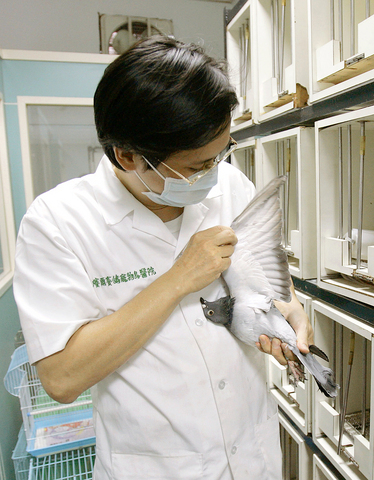Pigeon racing traces its roots to Europe, but Taiwanese have made it their own.
Every year, dozens of racing associations wager tens of millions of NT dollars on birds entered in grueling five-race competitions, while owners of the winners take home huge purses.
It has become such a big business that there are now pigeon hospitals catering to injured competitors with state-of-the-art techniques. And there are birdnappers who ransom the birds.

PHOTO: WALLY SANTANA, AP
Several times a year owners send their birds winging from one end of the island to the other, or flying from platforms at sea to Keelung 300km away.
Competitors are less than a year old and are chosen only after undergoing a rigorous training regime that emphasizes sticking to designated routes and building strength and perseverance.
The stakes are huge. Yeh Cheng-shen, chairman of the Taipei County Pigeon Racing Association and a participant in the sport for 54 of his 68 years, said he won NT$10 million (US$303,000) in a recent five-race meet. He estimated that meet's total pot at more than NT$2 billion.
"There's only one reason why pigeon racing is so popular in Taiwan -- gambling," he says.
Yeh, who estimates the value of his own racing flock in hundreds of thousands of NT dollars, says owners sustain significant losses during the races.
"Three thousand birds started our recent fall meet," he says. "Only 20 or 30 returned at the end of the event."
Yeh says most of the dropouts lose their way along the route, but some are trapped by criminals eager to exact ransoms.
"Gangsters erect these huge nets in valleys and other places the birds have to cross. Then they call the owner and offer to return the bird for what seems like a pretty reasonable price -- about NT$3,000," he says.
With the growth of racing, well-maintained bird hospitals have spread across the country.
The oldest is Taipei's Versele-Laga, established in 1985 by its current director, Li Jaw-yang, a graduate of Taiwan National University.
Li says about half of his clinic's patients are pigeons, nearly all of which are racers.
"Some are suffering from parasites, the kind of malady that any bird is prone to," he says. "But by far the most frequent problem involves injuries they sustain while racing. It's a very difficult sport."

‘DENIAL DEFENSE’: The US would increase its military presence with uncrewed ships, and submarines, while boosting defense in the Indo-Pacific, a Pete Hegseth memo said The US is reorienting its military strategy to focus primarily on deterring a potential Chinese invasion of Taiwan, a memo signed by US Secretary of Defense Pete Hegseth showed. The memo also called on Taiwan to increase its defense spending. The document, known as the “Interim National Defense Strategic Guidance,” was distributed this month and detailed the national defense plans of US President Donald Trump’s administration, an article in the Washington Post said on Saturday. It outlines how the US can prepare for a potential war with China and defend itself from threats in the “near abroad,” including Greenland and the Panama

A wild live dugong was found in Taiwan for the first time in 88 years, after it was accidentally caught by a fisher’s net on Tuesday in Yilan County’s Fenniaolin (粉鳥林). This is the first sighting of the species in Taiwan since 1937, having already been considered “extinct” in the country and considered as “vulnerable” by the International Union for Conservation of Nature. A fisher surnamed Chen (陳) went to Fenniaolin to collect the fish in his netting, but instead caught a 3m long, 500kg dugong. The fisher released the animal back into the wild, not realizing it was an endangered species at

The High Prosecutors’ Office yesterday withdrew an appeal against the acquittal of a former bank manager 22 years after his death, marking Taiwan’s first instance of prosecutors rendering posthumous justice to a wrongfully convicted defendant. Chu Ching-en (諸慶恩) — formerly a manager at the Taipei branch of BNP Paribas — was in 1999 accused by Weng Mao-chung (翁茂鍾), then-president of Chia Her Industrial Co, of forging a request for a fixed deposit of US$10 million by I-Hwa Industrial Co, a subsidiary of Chia Her, which was used as collateral. Chu was ruled not guilty in the first trial, but was found guilty

The Chinese Nationalist Party (KMT) is maintaining close ties with Beijing, the Democratic Progressive Party (DPP) said yesterday, hours after a new round of Chinese military drills in the Taiwan Strait began. Political parties in a democracy have a responsibility to be loyal to the nation and defend its sovereignty, DPP spokesman Justin Wu (吳崢) told a news conference in Taipei. His comments came hours after Beijing announced via Chinese state media that the Chinese People’s Liberation Army’s Eastern Theater Command was holding large-scale drills simulating a multi-pronged attack on Taiwan. Contrary to the KMT’s claims that it is staunchly anti-communist, KMT Deputy